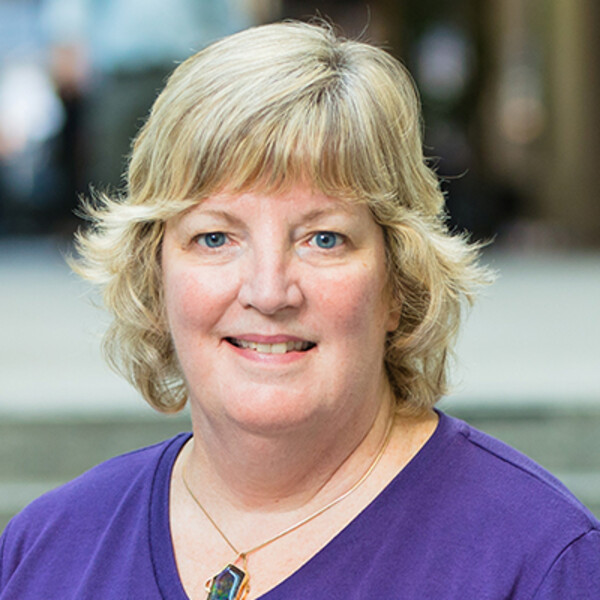Main Second Level Navigation
Michelle Bendeck
BSc, PhD

Dr Bendeck is on Twitter: @BendeckBendeck
Michelle Bendeck is a Professor in the Department of Laboratory Medicine and Pathobiology at the University of Toronto, and a Scientist in the Translational Biology and Engineering Program at the Ted Rogers Centre for Heart Research. She obtained her B.Sc (Hons) in Physiology at the University of Western Ontario, and her Ph.D. in Cellular and Experimental Pathology at the University of Toronto. She completed postdoctoral research at the University of Washington in the Department of Pathology.
Professor Bendeck is recognized for her pioneering work on matrix biology in cardiovascular disease. Her research is focused on understanding the molecular mechanisms involved in atherosclerosis, pulmonary hypertension, and heart failure. Her research is published in top journals, and she is frequently invited to lecture around the world.
Professor Bendeck has held leadership positions including Vice-Chair of Research in her department for several years, and was elected president of the two major scientific societies, the North American Vascular Biology Organization and the Canadian Society of Atherosclerosis, Thrombosis and Vascular Biology. She was a Heart and Stroke Foundation of Canada Career Investigator, and has held research funding from the Canadian Institutes of Health Research, the National Institutes of Health (USA), the Heart and Stroke Foundation of Canada, the Natural Sciences and Engineering Research Council, and the Canada Foundation for Innovation.
Research Synopsis
I run a cardiovascular biology lab investigating molecular and cellular mechanisms of atherosclerosis and fibrotic heart disease.
My lab and offices are located in the beautiful new MaRS West Tower. My lab is part of the Translational Biology and Engineering Program (TBEP) in the Ted Rogers Centre for Heart Research.
We have state-of-the-art research space and equipment, all designed to support the needs of our cardiovascular group.
The group is composed of 10 highly collaborative labs equally representing the faculties of medicine and engineering.
Cardiovascular diseases cause the majority of deaths in North America, and represent the greatest cost to the Canadian Health Care system.
We investigate the basic science mechanisms involved in atherosclerosis and heart failure, concentrating on interactions between cells and the extracellular matrix during fibrosis.
We are investigating experimental models of arterial injury and atherosclerosis in transgenic mice, studying the role of extracellular matrix, the novel collagen binding discoidin-domain receptors (DDRs), and cadherins in mediating smooth muscle cell and macrophage responses.
We are particularly interested in the initiation of atherosclerosis, and the atherosclerotic complications of plaque rupture and calcification.
These in vivo experiments are paralleled by in vitro studies investigating the activation of signaling pathways downstream of these receptors.
Selected Publications
Smooth muscle cell specific deletion of Col15a1 unexpectedly leads to impaired development of advanced atherosclerotic lesions. Brittany Durgin, Olga Cherepanova, Delphine Gomez, Themistoclis Karaoli, Gabriel Alencar, Joshua Butcher, Yu-Qing Zhou, Michelle Bendeck, Brant Isakson, Gary Owens, Jessica Connelly. American Journal of Physiology – Heart and Circulatory 312:H943-H958 (2017).
Deriving smooth muscle cells from mesenchymal stromal cells: Evolving differentiation strategies and current understanding of their mechanisms. Xiao Zhang, Michelle P. Bendeck, Craig A. Simmons, J. Paul Santerre. Biomaterials 145:9-22 (2017).
Role of smooth muscle cells in coronary artery bypass grafting failure. Kerry Wadey, Joshua Lopes, Michelle P. Bendeck, Sarah George. Cardiovascular Research. 114:601-610 (2018).
Diabetic vascular calcification mediated by the collagen receptor discoidin domain receptor 1 via PI3K/Akt/RUNX2 signaling axis. Marsel Lino, Mark H. Wan, Antonio S. Rocca, David Ngai, Navid Shobeiri, Guangpei Hou, Chunxi Ge, Renny T. Franceschi, Michelle P. Bendeck. Arteriosclerosis, Thrombosis and Vascular Biology. 38:1878-1889 (2018).
Cell-matrix interactions and matricrine signalling in the pathogenesis of vascular calcification. David Ngai, Marsel Lino, Michelle P. Bendeck. Frontiers in Vascular Medicine. DOI: 10.3389/fcvm.2018.00174 (2018).
Discoidin domain receptor 1 deletion in vascular smooth muscle cells leads to mislocalization of N-cadherin contacts. Songyi Xu, Sudarshan Bala, Michelle P. Bendeck. Biology Open DOI:10.1242/bio.041913 (2019).
Discoidin domain receptor 1- deletion ameliorates fibrosis and promotes adipose beiging, brown fat activity, and increased metabolic rate in a mouse model of cardiometabolic disease. Marsel Lino, David Ngai, Allison Liu, Amanda Mohabeer, Cameron Harper, Laura-Lee Caruso, Stephanie Schroer, Fred Fu, Trevor McKee, Adria Giacca, Minna Woo, Michelle P. Bendeck. Molecular Metabolism. DOI: 10.1016/j.molmet.2020.101006 (2020) (Interview with first author)
DDR1(Discoidin domain receptor-1)-RhoA axis senses matrix stiffness to promote vascular calcification. David Ngai, Marsel Lino, Katey Rothenberg, Craig Simmons, Rodrigo Fernandez-Gonzalez, Michelle P. Bendeck. Arteriosclerosis, Thrombosis and Vascular Biology 40:1763-1776 (2020) (Featured article July 2020).
Deletion of type VIII collagen reduces blood pressure, increases carotid artery functional distensibility and promotes elastin deposition. Amanda L.Mohabeer, Jeffery T. Kroetsch, Meghan McFadden, Negin Khosraviani, Thomas J. Broekelmann, Guangpei Hou, Hangjun Zhang, Yu-Qing Zhou, Minyao Wang, Anthony O. Gramolini, Robert P. Mecham, Scott P. Heximer, Steffen-Sebastian Bolz, Michelle P. Bendeck. Matrix Biology Plus. DOI: 10.1016/j.mbplus.2021.100085 (2021).
SMC-Has3-/- switches atherosclerotic lesion SMC to an ECM stabilizing phenotype. Felicia Hartmann, Daniel Gorski, Susanne Homann, Alexandra Newman, Katie Owsiany, Vlad Serbulea, Yuqing Zhou, Michelle Bendeck, Maria Grandoch, Gary K. Owens, Jens W. Fischer. Circulation Research 129: 992-105 (2021).
Nuclear DDR1-YAP/TAZ complex mediates a mechanosensitive positive feedback loop in vascular smooth muscle cells. David Ngai, Amanda Mohabeer, Marsel Lino, Michelle P. Bendeck. Revision requested, Matrix Biology 2022.
Honours and Awards
LMP Award for Undergraduate Teaching, University of Toronto (2022)
